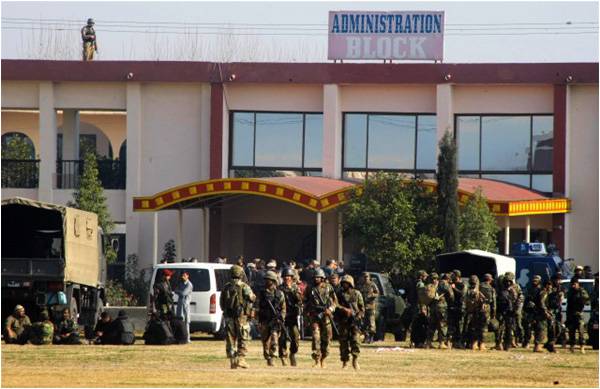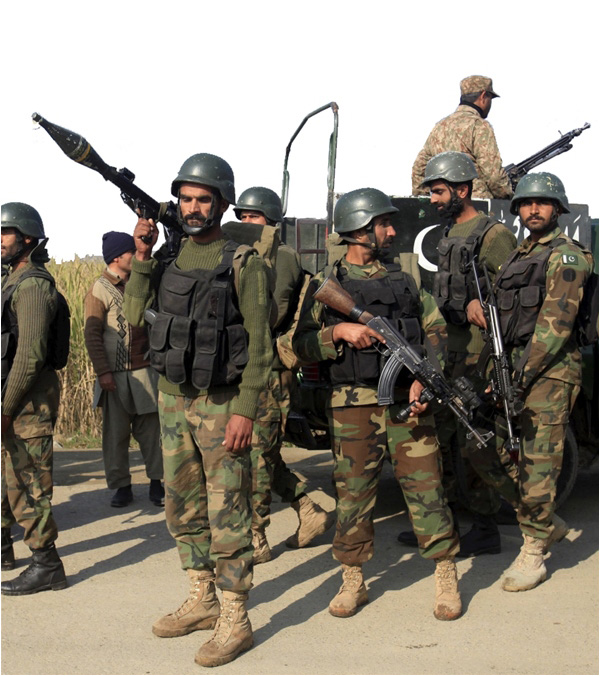
Around 9am on Wednesday, four gunmen – believed to be affiliated with the Tehrik-e-Taliban Pakistan (TTP) – climbed up the walls of Charsadda’s Bacha Khan University, entering the administration block. The typical January fog helped them dodge the sight of the university’s security guards as they headed straight towards the hostels. By 3 pm, all four militants had been confirmed dead by the ISPR, but not before they killed at least 21 people inside the university, most of whom were students.
“They were carrying AK-47s and weren’t older than the university students on the campus. They were well prepared and knew which part of the campus to target,” a university official said. “They went straight to the boys’ hostel, thinking that most of the students would be there,” he added. “Luckily most of them weren’t in their rooms. Some were having breakfast outside, some were in classrooms with the teachers, and others were preparing for the poetry recital. Otherwise, the death toll could have been a lot worse.”
The recital was scheduled to begin at 10:30am. It was to commemorate the death anniversary of Pashtun leader Abdul Ghaffar Khan, popularly known as Bacha Khan.
Vice Chancellor Fazal Rahim told reporters that there are 3,000 students in the university, and another 600 guests were expected at the recital. “There are male and female staff members and students on the campus,” said the top official, who had been en route to the campus when he was told about the attack.
“It is unclear whether the day was deliberately chosen for the attack to coincide with Bacha Khan’s death anniversary,” a security official said. “But the militants looked prepared for an APS-style massacre.”
Witnesses say the attackers headed towards other blocks when they found the boys’ hostel empty. “After initially taking up positions at the university’s entrance points, they dispersed,” said a boy who was able to escape the university premises. “One of them ran towards the roof, another was on the campus’ second floor, while the remaining two flanked them on the ground.”
Firing broke out between attackers and the university’s security guards, some of whom ran out to call military personnel. Before the security officials could reach the university, staff members tried to defend the students. Teachers in Khyber Pakhtunkhwa have been allowed to carry guns with them since the APS attack.
Lecturer Syed Hamid Hussain ordered his students to stay inside the classes as militants came towards the area.
“With the hostels empty, the classrooms were the most populated part of the campus in the morning,” the university official said. “Thankfully there weren’t many students, since the classes are off these days. But there were still several hundred students on campus (on Wednesday).”

Hussain, a chemistry professor, used his pistol to defend the students. Husain’s student Zahoor Ahmed said his teacher shielded the students from the bullets being sprayed. “He only had a pistol in his hands,” Zahoor said. “I saw him being hit by bullets. Two militants fired on him.” Zahoor managed to flee by jumping over the back wall.
The attack was initially claimed by TTP commander Umar Mansoor, who announced on his Facebook page around noon that four of his militants were sent to attack the university. Mansoor is believed to be the mastermind of the APS attack as well.
TTP central spokesperson Muhammad Khorasani however denied any involvement in the attack. “The TTP and its emir Maulana Fazaulllah have nothing to do with the attack,” Khorasani said in an email sent to the media. “We consider these youth studying in non-military educational institutes as our future, they are Muslims and their protection is our responsibility,” he added. “Those people who used the name of the Taliban in the attack will be tried in sharia courts.”
Haji Muhamamad Adeel, a veteran leader of the Awami National Party (ANP), called the attack an intelligence failure. “We have over 20 intelligence agencies. Why couldn’t they forestall the attack?” he asked. Intelligence officials claim reports of a likely attack had been shared with security officials.
Pakistan Tehrik-e-Insaf (PTI) Information Secretary Shaukat Yousafzai said the attack was a blowback to Operation Zarb-e-Azb. “It shows that these terrorists are getting desperate,” he said. “Terrorists know their days are numbered.”
A state of emergency was announced in the province’s educational institutions, and schools, colleges and universities all over Pakistan went on red alert. All institutions in Charsadda will remain closed until January 31.
Late on Wednesday, a high level security meeting was chaired by army chief Raheel Sharif, to discuss the attack and the overall performance in the ongoing military operation.
“The Charsadda attackers came from Afghanistan. And we will ask the Afghan government to hand over the culprits,” an ISPR source said.
“They were carrying AK-47s and weren’t older than the university students on the campus. They were well prepared and knew which part of the campus to target,” a university official said. “They went straight to the boys’ hostel, thinking that most of the students would be there,” he added. “Luckily most of them weren’t in their rooms. Some were having breakfast outside, some were in classrooms with the teachers, and others were preparing for the poetry recital. Otherwise, the death toll could have been a lot worse.”
The recital was scheduled to begin at 10:30am. It was to commemorate the death anniversary of Pashtun leader Abdul Ghaffar Khan, popularly known as Bacha Khan.
Vice Chancellor Fazal Rahim told reporters that there are 3,000 students in the university, and another 600 guests were expected at the recital. “There are male and female staff members and students on the campus,” said the top official, who had been en route to the campus when he was told about the attack.
“It is unclear whether the day was deliberately chosen for the attack to coincide with Bacha Khan’s death anniversary,” a security official said. “But the militants looked prepared for an APS-style massacre.”
The attack coincides with Bacha Khan's death anniversary
Witnesses say the attackers headed towards other blocks when they found the boys’ hostel empty. “After initially taking up positions at the university’s entrance points, they dispersed,” said a boy who was able to escape the university premises. “One of them ran towards the roof, another was on the campus’ second floor, while the remaining two flanked them on the ground.”
Firing broke out between attackers and the university’s security guards, some of whom ran out to call military personnel. Before the security officials could reach the university, staff members tried to defend the students. Teachers in Khyber Pakhtunkhwa have been allowed to carry guns with them since the APS attack.
Lecturer Syed Hamid Hussain ordered his students to stay inside the classes as militants came towards the area.
“With the hostels empty, the classrooms were the most populated part of the campus in the morning,” the university official said. “Thankfully there weren’t many students, since the classes are off these days. But there were still several hundred students on campus (on Wednesday).”

Hussain, a chemistry professor, used his pistol to defend the students. Husain’s student Zahoor Ahmed said his teacher shielded the students from the bullets being sprayed. “He only had a pistol in his hands,” Zahoor said. “I saw him being hit by bullets. Two militants fired on him.” Zahoor managed to flee by jumping over the back wall.
The attack was initially claimed by TTP commander Umar Mansoor, who announced on his Facebook page around noon that four of his militants were sent to attack the university. Mansoor is believed to be the mastermind of the APS attack as well.
TTP central spokesperson Muhammad Khorasani however denied any involvement in the attack. “The TTP and its emir Maulana Fazaulllah have nothing to do with the attack,” Khorasani said in an email sent to the media. “We consider these youth studying in non-military educational institutes as our future, they are Muslims and their protection is our responsibility,” he added. “Those people who used the name of the Taliban in the attack will be tried in sharia courts.”
Haji Muhamamad Adeel, a veteran leader of the Awami National Party (ANP), called the attack an intelligence failure. “We have over 20 intelligence agencies. Why couldn’t they forestall the attack?” he asked. Intelligence officials claim reports of a likely attack had been shared with security officials.
Pakistan Tehrik-e-Insaf (PTI) Information Secretary Shaukat Yousafzai said the attack was a blowback to Operation Zarb-e-Azb. “It shows that these terrorists are getting desperate,” he said. “Terrorists know their days are numbered.”
A state of emergency was announced in the province’s educational institutions, and schools, colleges and universities all over Pakistan went on red alert. All institutions in Charsadda will remain closed until January 31.
Late on Wednesday, a high level security meeting was chaired by army chief Raheel Sharif, to discuss the attack and the overall performance in the ongoing military operation.
“The Charsadda attackers came from Afghanistan. And we will ask the Afghan government to hand over the culprits,” an ISPR source said.

